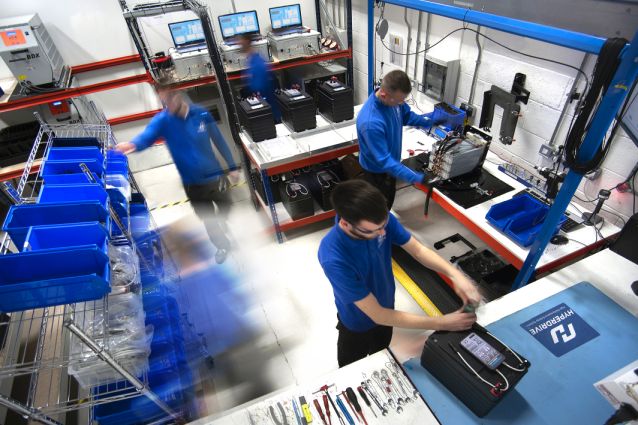February saw two automotive heavyweights in the form of Nissan and Honda make significant changes to their business plans. However, the reasons behind these changes vary distinctly.
The reason given by Nissan to no longer produce its X-Trail SUV in Sunderland highlights a growing concern that stretches beyond transport and into the battery energy storage sector – the uncertainty of Brexit. However, the reason given by Honda to leave its Swindon plant by 2021 – while damaging to the traditional automotive industry – provides the energy storage sector with reason to be hopeful for the future and the tools to fight off the uncertainty of Brexit – the global race to electrify.
Enjoy 12 months of exclusive analysis
- Regular insight and analysis of the industry’s biggest developments
- In-depth interviews with the industry’s leading figures
- Annual digital subscription to the PV Tech Power journal
- Discounts on Solar Media’s portfolio of events, in-person and virtual
Brexit and batteries
On 3rd February, Nissan announced that it could no longer commit to producing its new X-Trail SUV in Sunderland. The reason? Unequivocally Brexit. Announcing the news, Nissan said “the continued uncertainty around the UK’s future relationship with the EU is not helping companies like ours to plan for the future”.
Could the same be said for the battery energy storage sector? The short answer is yes. The uncertainty around our future relationship with Europe is concerning and bad for business on the whole. It threatens to cause significant disruption to British industry and prevent companies from advancing in the new clean growth economy – a lost opportunity that could see us surpassed by other nations, having an adverse effect on the employment opportunities and prosperity of future generations.
However, by preparing for the worst-case scenario, we can not only mitigate some of that uncertainty but also take steps to improve our business efficiency in general.
At Hyperdrive, we’ve taken a number of steps to achieve just this. As an initial precaution, we’ve taken action to shorten our supply chains, focusing on reducing logistical costs, transportation miles and reducing exposure to possible tariffs. As well as protecting us from the worst Brexit has to offer, it has also streamlined our supply chain, not to mention reduced our emissions footprint from the transportation miles of our raw materials and parts.
In addition to this, we’ve also looked to maximise the value of our intellectual property (IP) abroad. In 2018, we signed a long-term agreement with global manufacturers, Foxlink Automotive, to produce, sell and distribute our modular battery pack under Hyperdrive’s IP rights across Asia. In the near future, we will also be repeating this type of arrangement with a partner in North America, mirroring our manufacturing capability in the UK.
Combined, these actions have given us a global reach at a time of increasing political protectionism and tariffs, streamlined our supply lines – providing a highly resilient supply chain – and reduced the carbon footprint of our operations – all at a time of massive uncertainty.
This is allowing us to weather the storm of uncertainty surrounding Brexit and make good business decisions at the same time. Following these decisions, we now have the confidence to expand our manufacturing right here in the UK, with plans to double our capacity in early 2019.
We’re also very fortunate to have a close relationship with Nissan and while it won’t be producing the X-Trail in Sunderland, our strong links with its UK and overseas manufacturing operations and their international technical and marketing teams, coupled with our preparedness for Brexit is enabling us to plug into something much bigger – the growing global demand for electrification.

Plugging into a growing demand
It wasn’t until a few days ago that Honda confirmed its plans to close its Swindon car plant by 2021. While this was bad news for the UK economy and all those effected, the reasons behind the decision transcended the political uncertainty of Brexit.
This time, we are told the decision was due to global changes in the car industry; the need to launch electric vehicles; a fall in demand for diesel drivetrains and tougher emissions regulations than the Swindon plant is set up to serve. All factors that have shaken the car industry to its core but also the very same reasons why battery energy storage is hitting a steep growth curve.
In the rush to comply with ever-tightening emissions regulations, reduce air pollution and ditch dirty diesel, traditional OEMs, factory managers, construction companies and virtually every other sector which requires powertrains to operate, are clamouring to find an electrification partner. A partner to not only provide energy storage solutions but also guide them through the complexity of electrification.
With this in mind, as an organisation working within the energy storage sector, we’re uniquely fortunate to be offering a product and service that is in high demand. As we transition at break-neck speed towards an ever-electrified world, there will be significant disruption to business as usual – typified by recent events in the automotive industry. If as a sector we play to our strengths, collaborate and prepare for the second major disruption to the world economy – a potential no-deal Brexit scenario – we will comfortably survive the uncertainty of Brexit, and thrive in a post-Brexit, electrified world.

